|
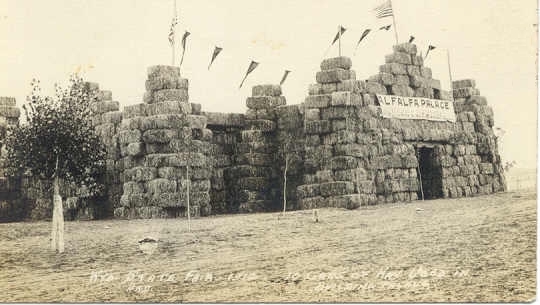
Alfalfa Palace, Wyoming State Fair, Douglas,
1912
The Alfalfa Palace made its first appearance at the 1912 State Fair. It was one of the highlights of the 1912 Fair held Sptember 24-27
and was the largest agricultural exhbit.
The Palace measured 30 feet by 100 feet in size and contained an estimated 100 tons of prime hay. The Palace was
originally constructed for the Big Horn County fair held the month before. The Palace was constructed immediately to
the right of the main entrance to the fair. It held several rail car loads of exhibits from the
Big Honr Basin.
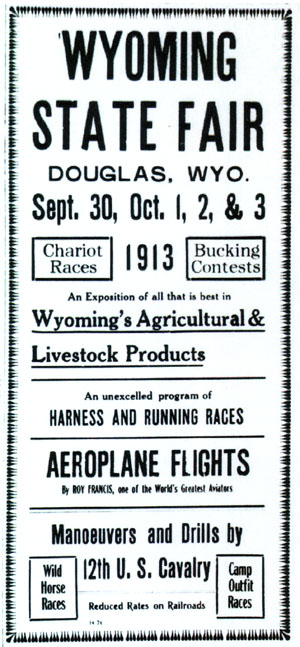 Advertisement for
1913 State Fair. Advertisement for
1913 State Fair.
As indicated in the advertisement to the left, a major attraction for the 1913 State Fair was to be the
appearance of Roy Francis and his aeroplane.
After the success of the 1910 fair, the Fair Association planned a spectatuclar show for 1911.
The hightlight was to be the appearance of an aeroplane. In that year, the Fair
contracted with the McCurdy-Willard Aeroplane Company for the appearance of "James C. "Bud" Mars, the "Curtiss Daredevil," reputedly the most daring flyer in the
United States at the
fair. Mars had previously appeared with great acclaim at the Kentucky Derby and made the first
aeroplane flight in Hawaii. In Kentucky, Mars appeared with Glen Curtiss. Over 10,000 spectators
filled the grandstand and clubhouse while thousands crowded rooftops. The Louisville Courier-Journal reported that
the roar of the crowd could be heard a mile away as the machines flew above the track at an altitude of
175 feet. Undoubtedly, the Fair Association envisioned a replication of sucess and publicity
that the Derby enjoyed from the flights over the track. It would certainly outdo the 1905 Weston County Fair which
featured a balloon ascension. Indeed balloon ascensions might be old hat. Casper's Fourth of July celebration in
1893 featured a balloon ascension. The appearance of Mars and his machine would guarantee the sucess of the
1911 fair.
On July 15, 1911, Mars crashed into a fence in Erie, Pennsylvania but recovered from his injuries. Everything was still on
go. Unfortunately, about two weeks before the advertised appearance of Mars, the Fair Association received a telegram:
New York, N. Y. Sept. 12, 1911
Wyoming State Fair,
Douglas, Wyo
Mars' altitude aeroplance wrecked. Douglas too high for racer. Am trying to close with other flyers. Very uncertain as wenty-four aviators smashed up last week. Wire Fowler and Ward. Make them offer for
stopping at your fair on their flights across the continent. Impossbile for Mars to be there.
. . . . . . .GEO. HAMILTON.
This was followed by another telegram:
New York, N. Y. Sept 12, 1911.
K. H. McWhinnie, State Fair Association, Douglas, Wyo.
Mars' machine wrecked. We are trying to secure an aviator for your fair. It may be necessary to cancel
contract. Will advise soon as possible.
M'CURDY-WILLARD AEROPLANE COMPANY.
A flurry of telegrams to other pilots and aeroplane exhibition companies failed secure a machine or
pilot. The failure to have aeroplane flights at the fair was front page, headline news, in an
"extra" edition of Bill Barlow's Budget, September 28, 1911.
A major attraction for the 1911 Fair was the reappearance of the 9th Cavalry. The Budget reported:
As usual one of the most interestng features of the fair is the riding exhibitions of the
Ninth Cavalry. The boys are riding better than ever before and are putting on "stunts" that is more than worth the admission to the fair grounds.
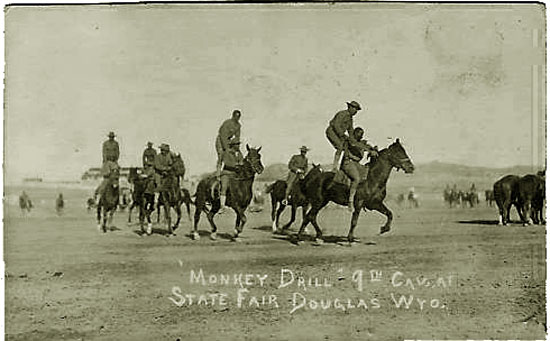
9th Cavalry performing stunts.
The 9th Cavalry enlisted men also gave an exhibition of the Roman Race.
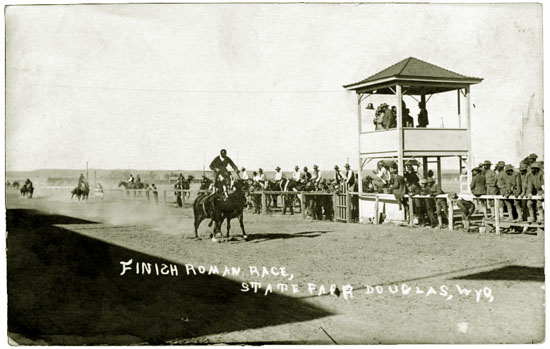
Roman Race, 1911.
A 9th Cavalry baseball team also competed against a professional baseball team, the Cheyenne Indians.
The 9th Cavalry Band also provided a major attraction for the fair. Each evening the band provided concerts in the
Opera House. The programs incuded band selections, "plantation songs," as well as "buck and wing
dancing." Buck and wing dancing is a form of clogging, popularized in minstral shows.
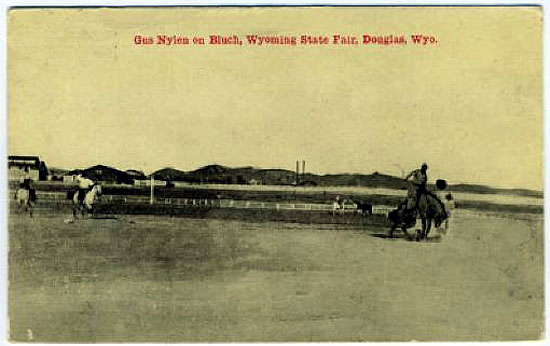
Gus Nylen on Bluch, 1911.
Not withstanding the problem in 1911, the Fair booked another aeroplane pilot for 1912, Roy Francis.
Captain Francis was one of the foremost aviators of the time and held the world record for altitude having ascended in Nevada to over 8,000 feet above sea level.
In the 1912 State Fair, his Curtiss machine flew twice a day for 15 minutes each.
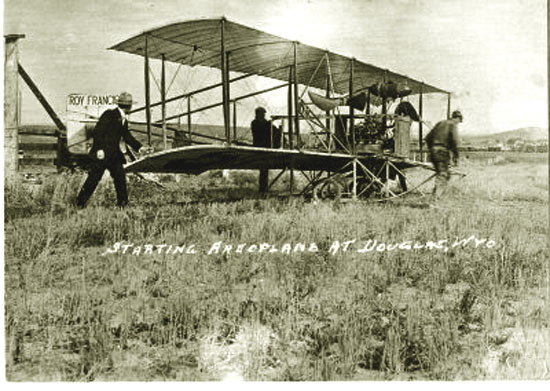
Roy Francis's aeroplane, Wyoming State Fair, 1912.
The 1912 Fair was a success. Thus, the exhibition was expanded for the 1913 Fair. A new $20,000 Agricultural and Horticultual Building
was added. The new building beside adding space for additional exhibits. the building included a new lunch
counter. Renovations were made to the old exhibition building. Space was provided in the new
building for agricultual lectures. Again the largest exhibit was that of the Big Horn Basin who brought in 13 carloads of
exhibits by special train. Some of the exhibited displayed crops not normally associated with Wyoming. The Big Horn Basin displayed
tobacc. Jirah displayed various forage crops including sugar cane.
The 1913 Fair featured the 12th United State Cavalry. As depicted in the next photo, the aeroplane exhibition was cut short.
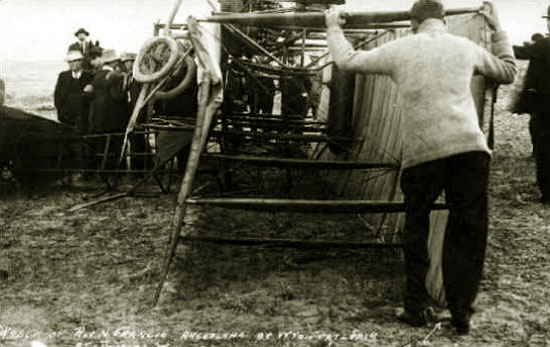
Roy Francis's aeroplane, Wyoming State Fair, 1913.
For the next two years feats of daring by aeronauts were omitted from the program.
Music this page: Comes Josephine in my Flying Machine.
Next page: Wyoming State Fair -- 1914-1918.
|